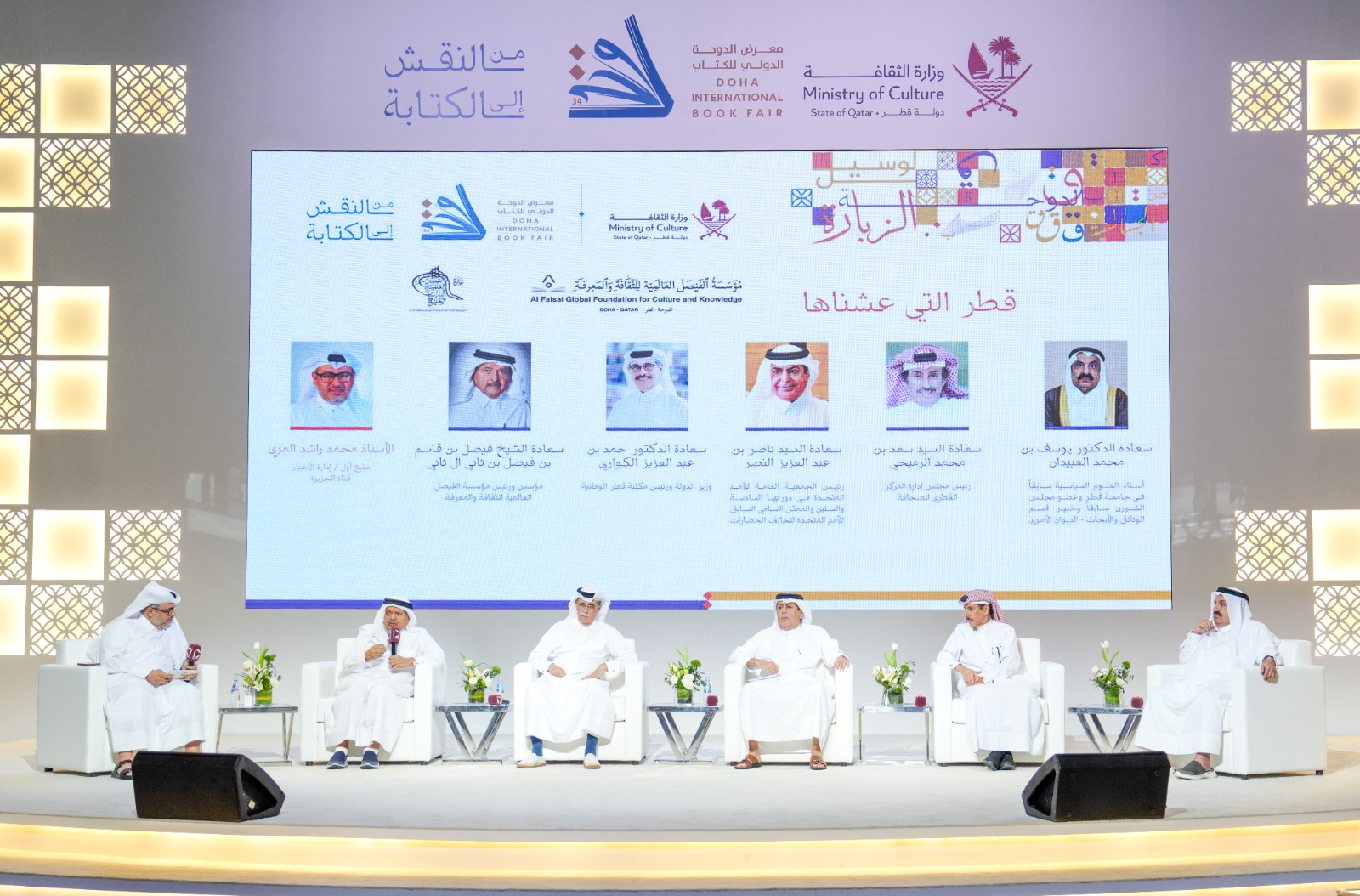The 34th Doha International Book Fair hosted a special symposium titled “Qatar Through My Eyes”, aimed at documenting and preserving the nation’s collective memory. The event was organized by the Ministry of Culture in cooperation with the Al Faisal Global Foundation for Culture and Knowledge.
The session brought together prominent national figures and dignitaries, including H.E. Sheikh Abdulrahman bin Hamad Al Thani, Minister of Culture; H.E. Ibrahim bin Ali Al-Mohannadi, Minister of Justice and Minister of State for Cabinet Affairs; H.E. Dr. Abdulaziz bin Nasser Al Khalifa, President of the Civil Service and Government Development Bureau; and H.E. Mohammed bin Ali Al-Mannai, Minister of Communications and Information Technology.
The symposium featured key contributions from H.E. Dr. Hamad bin Abdulaziz Al-Kuwari, Minister of State and President of Qatar National Library; H.E. Sheikh Faisal bin Qassim Al Thani, Chairman of the Al Faisal Foundation; H.E. Nasser bin Abdulaziz Al-Nasser, former President of the UN General Assembly; Dr. Youssef bin Mohammed Al-Obaidan, a distinguished academic; and H.E. Saad bin Mohammed Al-Rumaihi, Chairman of the Qatar Press Center. The discussion was moderated by Al Jazeera journalist Mohammed Al-Marri.
In his opening remarks, Dr. Al-Kuwari stressed the importance of cultural memory as a living, evolving narrative shaped by experience, struggle, and aspiration—not merely the recording of events. He called for the continuous documentation of Qatar’s cultural heritage and emphasized the central role played by Qatar National Library in preserving this legacy. He also commended the integrated efforts of national institutions, particularly the Ministry of Culture and the Qatar National Archives.
Sheikh Faisal bin Qassim Al Thani reflected on the motivation behind his book “Qatar Through My Eyes”, describing it as a personal attempt to capture the
country’s collective resilience and unity in the face of challenges. He highlighted the importance of both individual and collective storytelling as a national duty.
H.E. Nasser Al-Nasser shared significant moments from his diplomatic career, including Qatar’s membership on the UN Security Council, the country’s role in halting the 2006 war on Lebanon, and his leadership of the UN General Assembly during a critical phase of regional transformation. He also spoke about Qatar’s global efforts to raise awareness on autism and foster cross-cultural dialogue.
H.E. Saad Al-Rumaihi praised Sheikh Faisal’s dedication to preserving Qatar’s material heritage through the Sheikh Faisal Museum and its rare collection. He also underscored the influence of Qatari media in enhancing the nation’s image internationally.
Dr. Youssef Al-Obaidan described “Qatar Through My Eyes” as a “vital academic reference” for understanding the modern history of Qatar. He revealed that the book is under academic review for inclusion in university curricula. According to Al-Obaidan, the work serves as a living testimony of a key figure in Qatar’s transformation and a valuable resource for future generations.
The symposium concluded with a unified call to elevate documentation efforts and safeguard Qatar’s national and cultural memory through sustained scholarly and institutional collaboration.
On the sidelines of the symposium, Al Faisal International Foundation for Culture and Knowledge, chaired by H.E. Sheikh Faisal bin Qassim Al Thani, launched the “Al Faisal International Prize for Gulf Studies.”
The prize was inaugurated during the 34th Doha International Book Fair and aims to encourage scientific research on Gulf-related issues and promote a deeper academic understanding of the region on an international scale.
During the event, H.E. Sheikh Faisal bin Qassim Al Thani honored the winners of the first edition of the award. The recipients were:
· Prof. Dr. Youssef bin Mohammed Al-Obaidan, renowned Qatari intellectual and academic, representing the Qatari category
· Dr. Abdullah Baabood, Qatar Chair Professor at Waseda University in Tokyo
· Dr. Gerd Nonneman, Professor of International Relations at Georgetown University in Qatar
The awardees expressed their appreciation for the recognition and praised the prize’s role in advancing the field of Gulf studies. Professor Gerd Nonneman emphasized that Gulf studies have become central to understanding global politics, driven by the increasing influence of Gulf states on the world stage. He also highlighted the emergence of a new generation of Gulf-based researchers bringing fresh hope to the field.
Dr. Abdullah Baabood described the award as a strong incentive for more in-depth research. He noted that the study of history is not merely about recalling the past but serves as a vital tool for understanding the present and planning for the future.
Ibrahim Badawy, Director of the Al Faisal Global Foundation for Culture and Knowledge, stated that the launch of the prize marks a significant milestone in the foundation’s mission and reflects its commitment to supporting knowledge and scholarship in line with Qatar National Vision 2030. The vision emphasizes honoring intellectual and academic elites who have deepened the scientific understanding of Qatar and the Gulf within both local and global contexts.
He added, “We take pride in positioning our foundation as a platform that promotes knowledge and honors researchers who have made meaningful contributions to the study of regional issues—especially at a time when global transformations demand a rigorous academic reading of history, reality, and the future.”
Badawi concluded by affirming the foundation’s continued support for intellectual and academic excellence, stating, “We are committed to transforming Gulf memory into a source of scholarly inspiration and ensuring that this prize remains a permanent platform that connects the past to the present and builds bridges to the future.”
